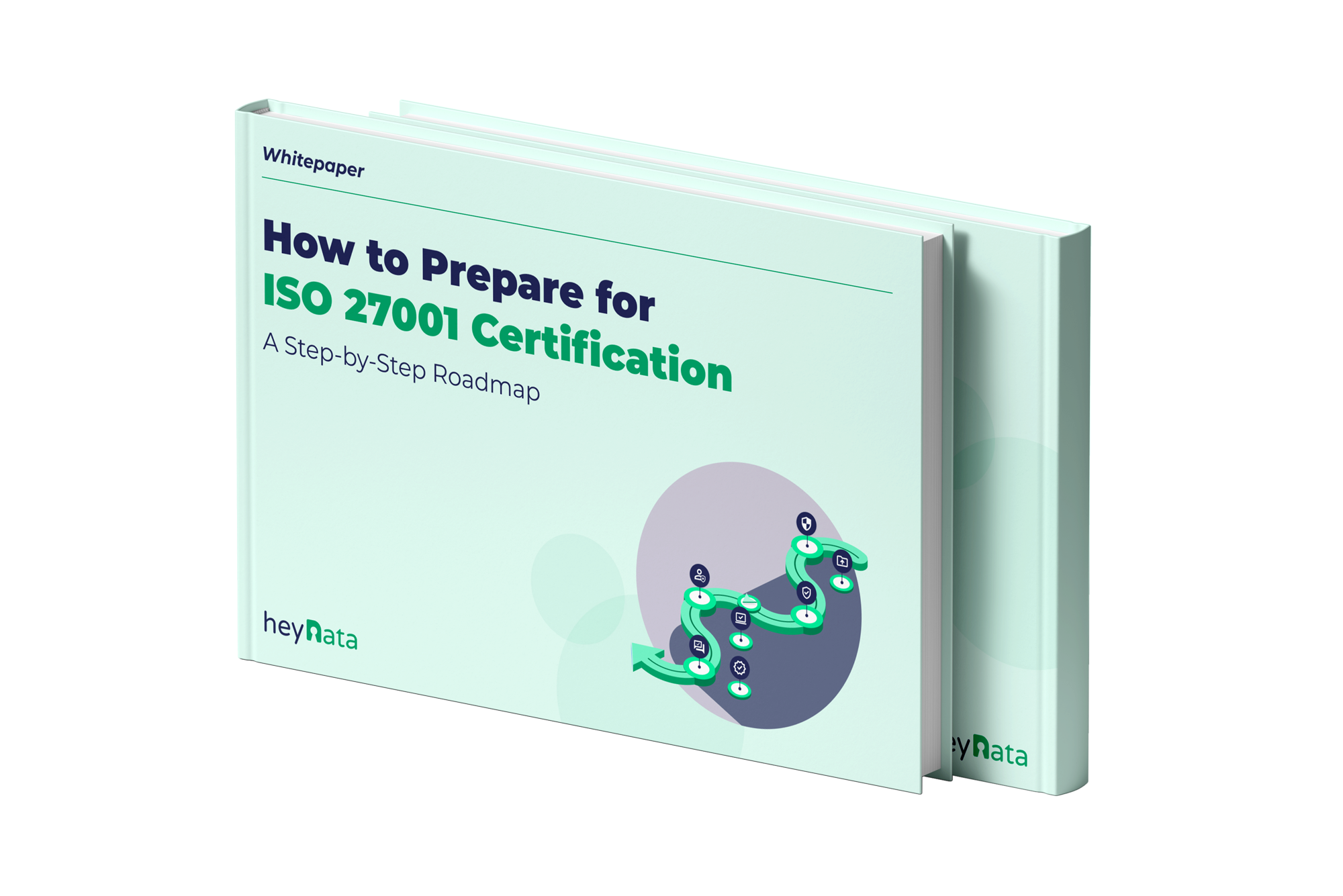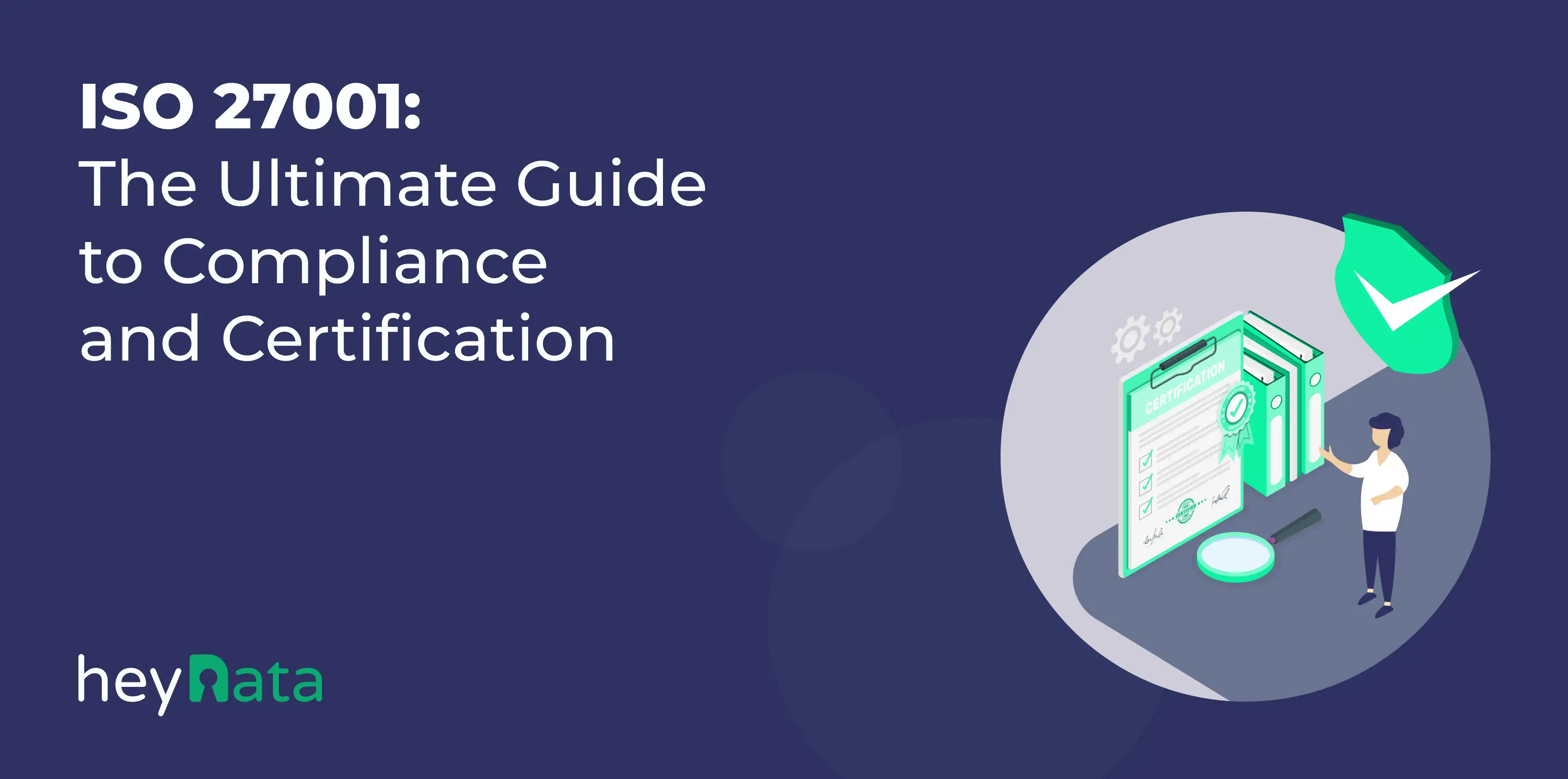
Simplify Your ISO 27001 Journey
ISO 27001 doesn’t have to drain your time or team. Get our expert guide and simplify your certification process.

ISO 27001: The Ultimate Guide to Compliance and Certification
ISO 27001 is a key standard in information security management, offering a structured way to handle sensitive company data. Getting ISO 27001 certified isn't just about following rules; it shows your dedication to protecting information from ever-changing cyber threats.
This article is your complete guide to understanding ISO 27001 certification. Inside, you'll discover practical tips and expert guidance to help you understand this crucial standard. Our goal is to make sure your organization's information security management system (ISMS) is strong and meets all requirements.
Table of Contents:
What is ISO 27001?
ISO 27001, developed by the International Organization for Standardization (ISO), is a globally recognized standard for information security. It provides a framework for establishing, implementing, maintaining, and continually improving an Information Security Management System (ISMS). An ISMS is a systematic approach to managing sensitive company information, ensuring its confidentiality, integrity, and availability.
Key Requirements of ISO 27001
- Risk Assessment: Identifying and assessing risks to information security is fundamental. Organizations must evaluate potential threats and vulnerabilities to their information assets.
- Control Implementation: Based on the risk assessment, specific controls need to be implemented to mitigate identified risks. These controls cover various aspects such as access control, physical security, and incident management.
- Continual Improvement: The standard emphasizes the need for ongoing improvement of the ISMS. This includes regular reviews and updates to policies and procedures in response to emerging threats and changes in the business environment.
In essence, ISO 27001 serves as a comprehensive guide for organizations aiming to safeguard their information assets against cyber threats.
Who Needs ISO 27001 Certification?
ISO 27001 compliance is crucial for various types of organizations, particularly those that handle sensitive data and need to meet stringent regulatory requirements. Businesses to business (B2B) firms often require ISO 27001 certification to ensure the security of their information assets and foster trust with their partners and clients.
Related blogs: The process of an internal audit for ISO 27001 certification

Simplify Your ISO 27001 Journey
ISO 27001 doesn’t have to drain your time or team. Get our expert guide and simplify your certification process.
Benefits of ISO 27001 Certification for Businesses
Implementing ISO 27001 controls offers a strategic advantage in risk management and cybersecurity. By adopting this standard, organizations can systematically identify, evaluate, and address potential threats. This proactive approach significantly reduces the likelihood of data breaches and cyber-attacks.
Types of Organizations Benefiting from ISO 27001 Certification
ISO 27001 certification can benefit a wide range of organizations, including:
- Government Entities: These organizations manage critical infrastructure and sensitive information, necessitating robust information security measures.
- Healthcare Sector: With patient data becoming increasingly digital, maintaining confidentiality, integrity, and availability of health records is paramount.
- Finance Industry: Given the high stakes of financial data breaches, financial institutions prioritize ISO 27001 certification to safeguard their information.
- Technology Companies: These businesses often handle vast amounts of user data, making ISO 27001 an essential part of their security strategy.
Key benefits of ISO 27001:
- Risk Mitigation: The structured process of risk assessment helps pinpoint vulnerabilities and implement appropriate controls. This minimizes the impact of security incidents.
- Cyber Threat Protection: Continuous monitoring and improvement of security measures ensure robust defenses against evolving cyber threats.
- Customer Trust: Demonstrating compliance with internationally recognized standards reassures clients about the safety of their information.
- Business Reputation: Being certified enhances an organization's reputation, making it a preferred partner in industries where data protection is paramount.
Organizations that embrace ISO 27001 not only reinforce their security posture but also gain a competitive edge by showcasing their dedication to safeguarding sensitive information.
Comparing ISO 27001 with NIS2: Key Differences and Complementarity
ISO 27001 also plays a significant role in helping organizations comply with various regulatory frameworks such as the NIS-2 Directive.
The NIS-2 aims to strengthen the cybersecurity framework across EU member states. It addresses network and information system security by setting higher standards for critical infrastructure protection and ensuring service continuity. This directive is part of the broader cybersecurity policies implemented by the EU.
Key Distinctions
1. Scope
ISO 27001 focuses on establishing a robust Information Security Management System (ISMS) applicable to any organization, regardless of size or sector.
NIS-2 targets operators of essential services and digital service providers, emphasizing national and cross-border cybersecurity resilience.
2. Requirements
ISO 27001 involves comprehensive risk assessment, control implementation, and continual improvement.
NIS-2 mandates specific technical and organizational measures, incident reporting, and cooperation between member states.
Both frameworks emphasize risk management but approach it differently. ISO 27001 provides a flexible ISMS structure adaptable to various contexts, while NIS-2 prescribes sector-specific requirements to safeguard critical infrastructures.
Real-Life Examples of ISO 27001 Adoption: claireLogic
Many companies have successfully used ISO 27001 certification to improve their security, make operations more efficient, and gain a competitive advantage. claireLOGIC, an IT Managed Service provider serving finance, legal, and retail sectors, successfully implemented ISO 27001.
Challenges:
- Inconsistent Security Practices: Security measures varied across departments, leading to potential vulnerabilities.
- Limited Asset Visibility: A lack of clear oversight of key assets and associated risks made prioritizing security difficult.
- Supply Chain Concerns: Uncertainty about third-party security posed risks in regulated industries.
- Evolving Threats: The rapidly changing cybersecurity landscape required a more proactive approach.
Outcomes of ISO 27001 Adoption:
- Swift Certification: Achieved ISO 27001 certification in 9 months.
- Improved Risk Management: Gained clearer insights into key assets and risks.
- Enhanced Supply Chain Security: Strengthened security posture across the supply chain.
- Proactive Threat Response: Positioned to better manage emerging cybersecurity threats.
Adopting ISO 27001 fosters a proactive security culture, positioning businesses to thrive in today's digital landscape.
Navigating the Path to ISO 27001 Compliance: A Comprehensive Framework for Implementation
Achieving ISO 27001 certification requires a structured approach. This guide breaks down the complex process into manageable phases, ensuring clarity at each step.
Step-by-Step Process for Achieving ISO 27001 Certification
1. Initial Project Planning
- Clearly define the scope of the Information Security Management System (ISMS).
- Assign specific roles and responsibilities to the project team.
- Develop a detailed project timeline, ensuring realistic deadlines for each phase.
2. Risk Assessment
- Identify potential information security risks.
- Analyze and evaluate the risks.
- Prioritize risk treatment options.
3. Control Design and Implementation
- Select appropriate controls from Annex A of ISO 27001.
- Implement chosen controls to mitigate identified risks.
- Document control measures and their effectiveness.
4. Employee Training
- Conduct awareness programs for all staff.
- Provide in-depth training for key personnel involved in ISMS activities.
- Encourage a culture of continuous improvement in information security practices.
5. Documentation Management
- Maintain detailed records of all ISMS processes and procedures.
- Regularly update documentation to reflect changes in the environment or operations.
- Ensure accessibility and accuracy of documents during audits.
6. Internal Audits and Management Review
- Conduct periodic internal audits to assess compliance with ISO 27001 standards.
- Perform management reviews to evaluate the effectiveness of the ISMS.
- Address non-conformities and implement corrective actions.
To learn more about the internal audit process for ISO 27001, click here.
7. Certification Audit
- Engage an accredited certification body to perform an external audit.
- Prepare for Stage 1 (documentation review) and Stage 2 (on-site audit).
8. Recertification Audits
- Plan for regular surveillance audits to ensure continual compliance.
- Schedule recertification audits every three years.
Implementing these steps systematically ensures a robust framework that not only meets ISO 27001 requirements but also enhances overall information security posture.
Leveraging heyData in Your Certification Journey
heyData compliance software offers innovative solutions designed to streamline the certification process for organizations aiming to achieve ISO 27001 compliance. By providing a comprehensive and custom framework, heyData simplifies the complex tasks involved, ensuring a smoother and more efficient path to certification.
Key Benefits
- Tailored ISO 27001 Framework: heyData delivers a customized ISO 27001 framework tailored to each company's unique needs and challenges, ensuring the compliance process is both effective and relevant.
- Rigorous Assessment Process: The software includes a comprehensive internal audit process, allowing organizations to thoroughly assess their compliance status and pinpoint areas for improvement prior to external certification audits.
- Time Efficiency: By offering a pre-designed ISO 27001 framework, heyData significantly reduces the time and effort needed to create and implement compliance strategies, streamlining the entire process.
Using heyData compliance software, organizations can efficiently navigate their ISO 27001 certification journey, ensuring a smoother path toward achieving robust information security management.
Conclusion
In conclusion, embracing ISO 27001 certification is not merely a regulatory requirement but a strategic imperative for organizations aiming to bolster their information security posture. By adopting a robust Information Security Management System (ISMS), businesses can effectively mitigate risks, enhance their reputation, and gain a competitive edge in today's digital landscape.
The tailored solutions provided by platforms like heyData further streamline the compliance process, enabling organizations to navigate the complexities of certification with greater ease and efficiency. Ultimately, prioritizing ISO 27001 is an investment in resilience that equips organizations to face evolving cyber threats and secure their critical assets for the future.
Important: The content of this article is for informational purposes only and does not constitute legal advice. The information provided here is no substitute for personalized legal advice from a data protection officer or an attorney. We do not guarantee that the information provided is up to date, complete, or accurate. Any actions taken on the basis of the information contained in this article are at your own risk. We recommend that you always consult a data protection officer or an attorney with any legal questions or problems.


